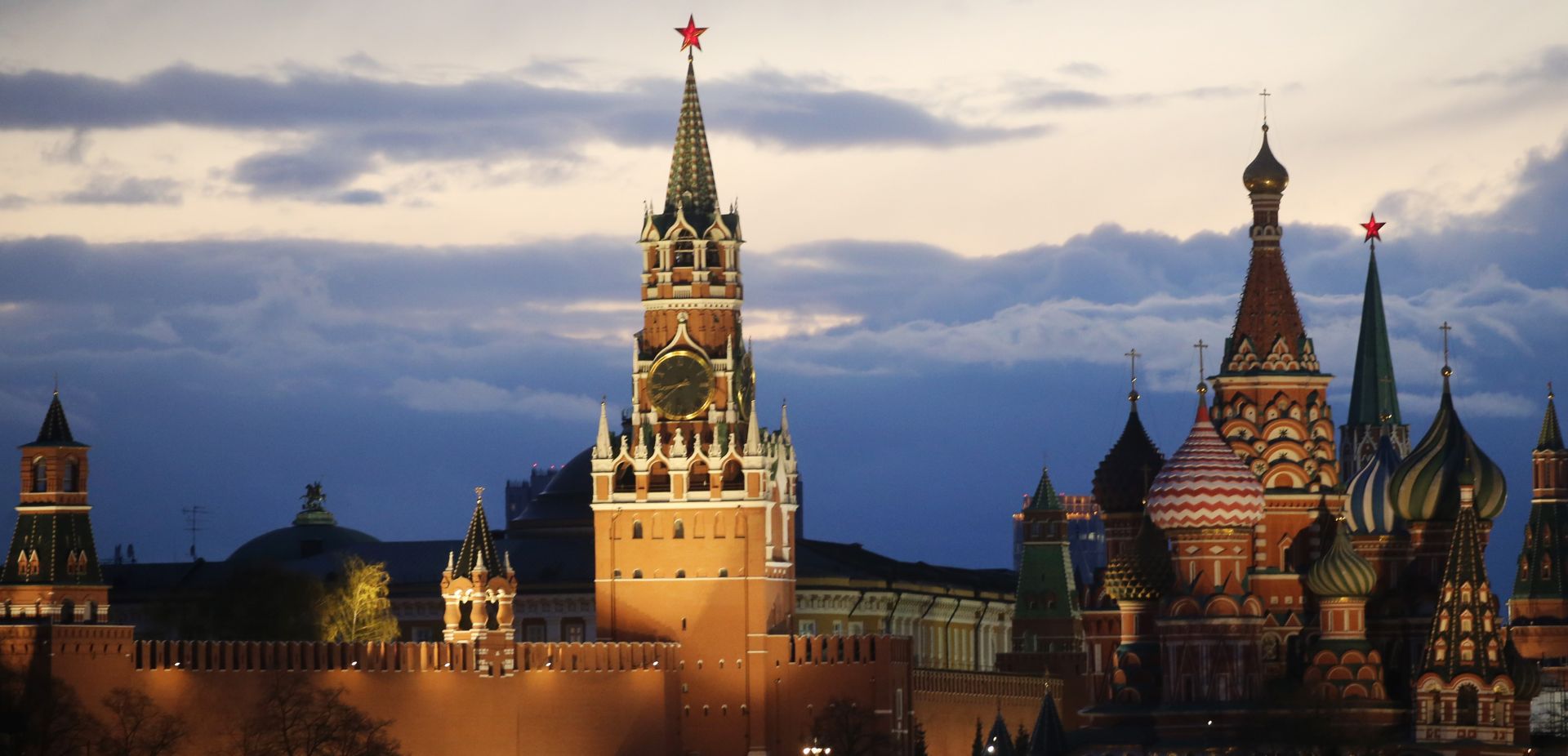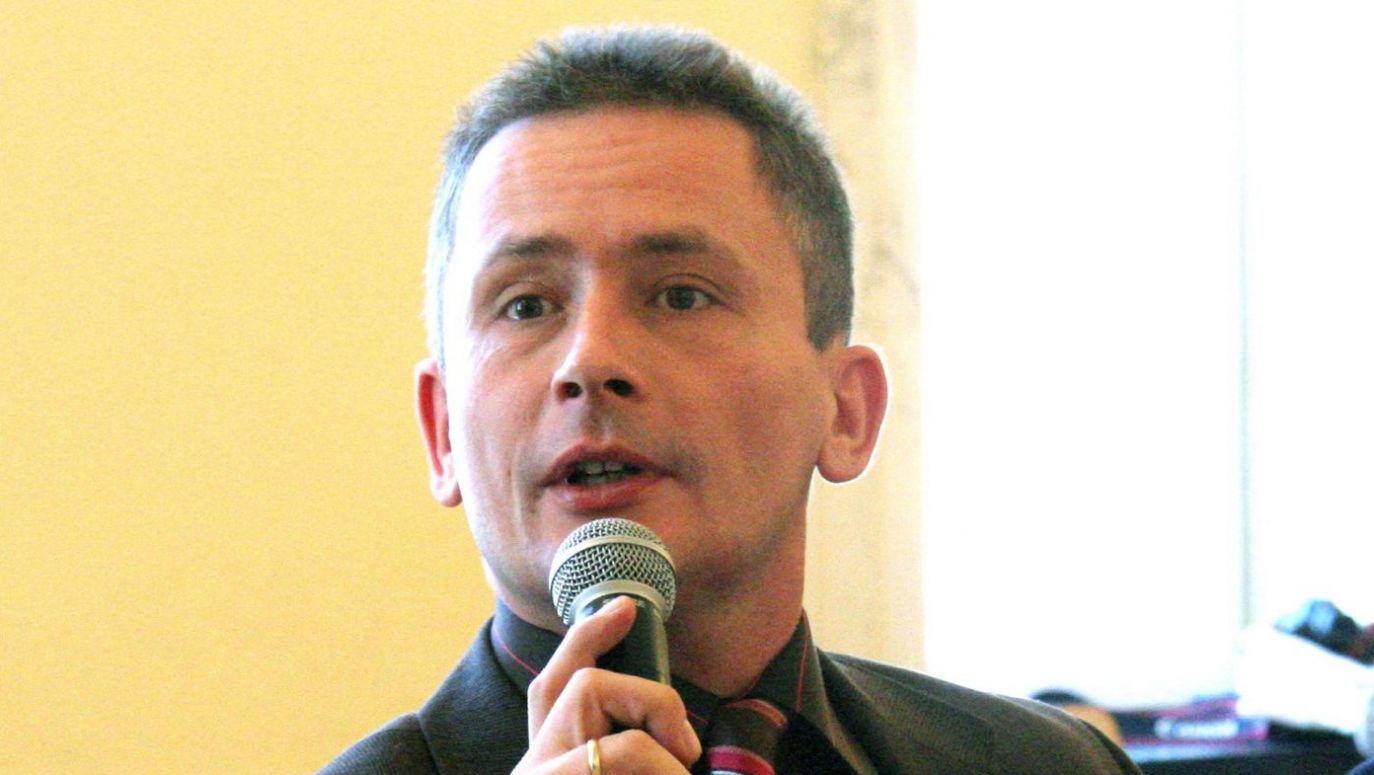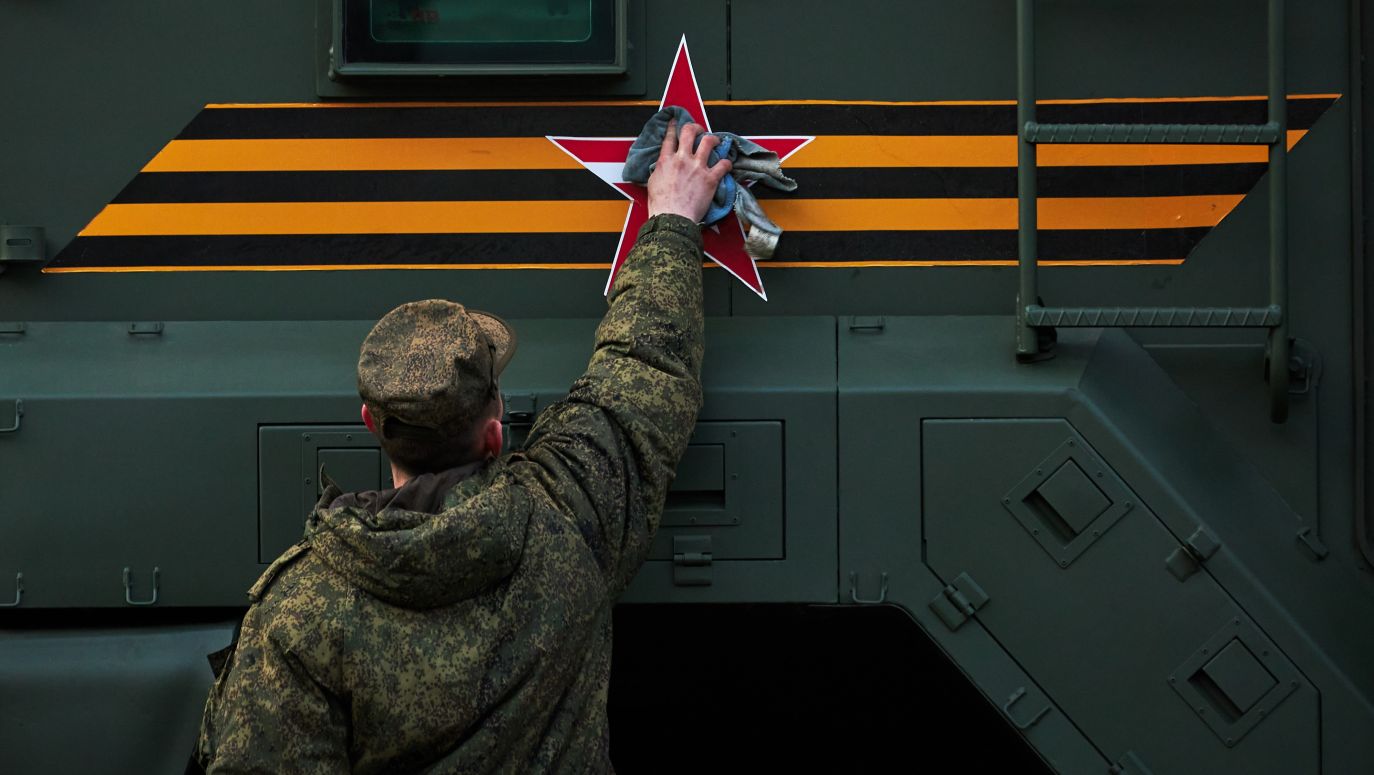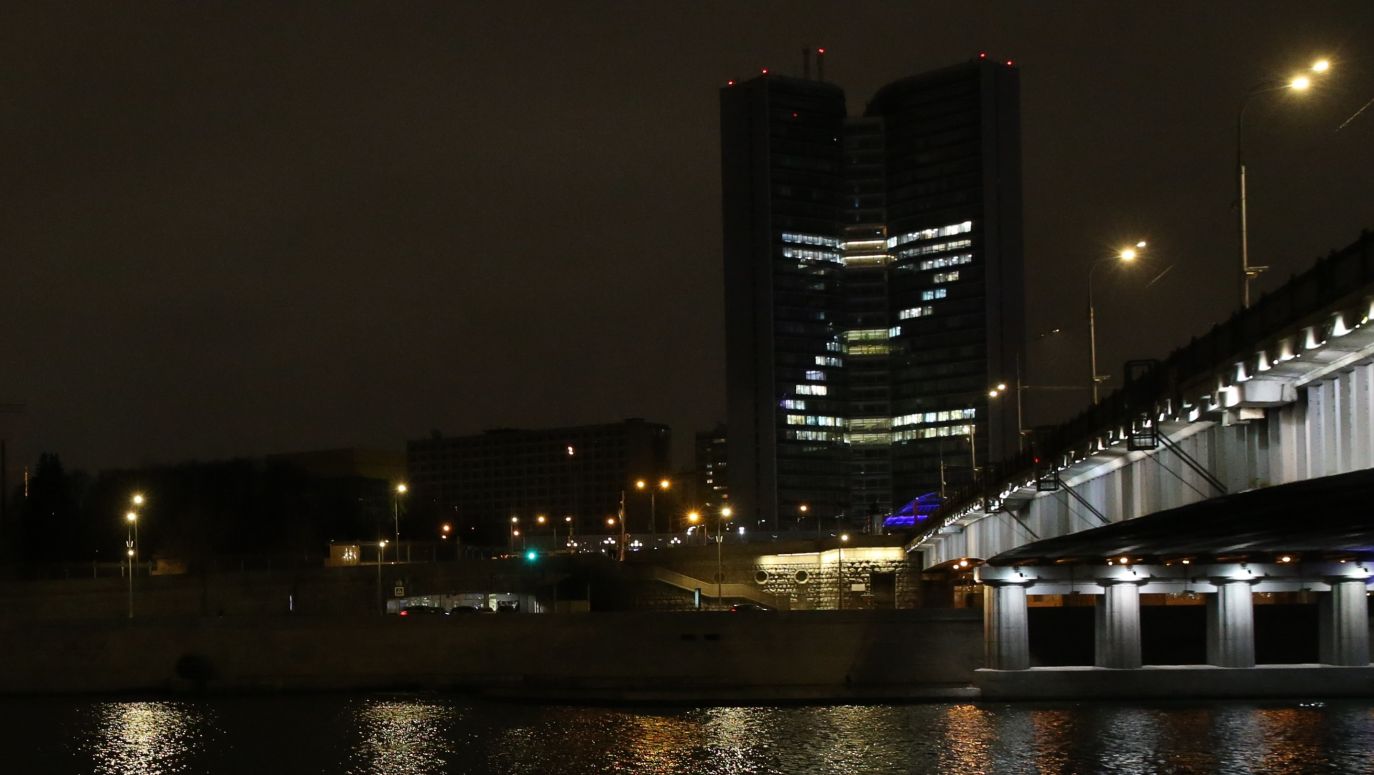"Do not believe in empty shelves in Russian shops. Nothing of the sort is happening," says the Polish diplomat
11.05.2022
In Russia, rehabilitation of Stalin is taking place, but it does not cover all aspects of his rule. First of all, it is emphasised that he was the victor of the Second World War and the founder of Russian power. At the same time, the authorities condemn Bolshevism. And they do not deny that Stalin committed terrible crimes. And his cult is often anti-government - says Piotr Skwieciński, director of the Polish Institute in Moscow, expelled from Russia in April 2022.
TVP WEEKLY: During your three-year stay in Moscow, where you held the post of diplomat, director of the Polish Institute, were there any situations - especially after the Russian invasion of Ukraine began - in which you felt threatened?
PIOTR SKWIECIŃSKI: Before the invasion of Ukraine, there were two situations that, while not very dangerous (or perhaps at all), were unnerving. In 2019, I was greeted in Moscow by the barrage of Rossiya24 television. Already on the eve of my arrival, the station prepared a large and completely deceitful material about me, including quotes from my articles taken out of context and given out of order. The message was as follows: Poland is sending some pathological Russophobe. Later, there were several other similar materials.
And the first time I attended an event outside the Polish Institute - at the Gulag History Museum, where we organised a film screening - a Rossija24 crew turned up there. I refused to be interviewed. She ran after me with the camera a few hundred metres. Together with me and an employee of the institute walked a certain Russian democrat, our friend, but also a hothead, who at one point could not stand it and walked into the camera operator with his body. It became a bit dangerous. I was afraid that a fight would break out, but fortunately it did not.
And the second situation?
In October 2021, we were organising a screening of Agnieszka Holland's film 'Citizen Jones' at the headquarters of the Memorial Association. After a quarter of an hour, a masked militia burst into the auditorium. They shouted to us: "Snout to the ground!", etc. I looked at them, some of their faces were visible despite their camouflage. I decided that, fortunately, they were not Kadyrovists, so they would shout and leave.
How did it end?
The police arrived. We were told that we could not leave because everyone had to give evidence. I sat there until half past three in the morning. I could have shown my diplomatic passport - probably then I would have been released. But I did not want to leave my partners from Memorial alone. This was appreciated. That evening, a Memorial activist wrote on the social networking site that Piotr Skwieciński was the Raoul Wallenberg of the Putin era (laughs).
Dangerous situations also occurred after the invasion began?
No, although towards the end of my stay in Moscow I was more cautious when walking in the streets, I paid attention to whether anyone suspicious was approaching, and so on. On the other hand, I've heard that in the diplomatic corps, but not the Polish one, it happened that someone came up in the street and started asking strange questions like, "Would you be interested in a dialogue about staying in Moscow?"
It seems that leaving Moscow was not without its difficulties.
The day before our ambassador was called to the Russian Foreign Ministry, where he was handed a list of deported diplomats, ditches were suddenly dug in front of all the gates to the embassy compound - except for the ceremonial gate at the embassy itself, intended for the ambassador and guests. On top of that, there were FSB guys hanging around the outpost, dressed as pipe workers. We noticed that they had a street cleaning truck with which they could block the exit if we tried to leave somehow.
The residential building for diplomats and technical staff, where we had private cars parked, is separated from the embassy by a solid fence. It is therefore impossible to get by car from under this building to the embassy, where the only unlocked gate was, without first driving outside the premises.
I suspect that the Russians thus wanted to prevent us from leaving Moscow by the deadline, which would have meant that we were in Russia illegally. We would then be prevented from leaving the outpost; we would de facto become hostages. This would certainly be used for propaganda purposes. Moreover, in exchange for permission for our departure, Russia would make its demands - Poland would be forced to negotiate.
However, it has managed to leave Russia on time.
Thanks to the operation we carried out. A modest employee of the embassy came up with the idea - he should be awarded a medal for it. Well, one day, at rush hour, two of our semi-trucks drove out from under the embassy. They circled the whole complex, drove up to the gate on the side of our apartment building and blocked the street there. A traffic jam ensued, which prevented FSB officers from using the street cleaning truck.
Then the embassy staff opened the gate and threw a makeshift 'pontoon bridge' across the ditch, in the form of very thick sheets of metal. We then drove the cars out through this gate, circled the complex and entered the ceremonial gate in front of the embassy. This gate the Russians chose not to block - then they would have prevented the ambassador himself from moving, thus breaking the Vienna Convention.
The FSB agents must have been surprised.
They ran up to the policemen guarding the embassy and clearly had a grudge against them. The policemen then twice, on seeing our embassy staff, threw towards them: "Maladcy! Maladcy, Polaki!" [maladcy - braves].
According to a poll by the Kremlin-independent Levada Center, 82 percent of Russians support the activities of their president. Why are Russians loyal to Vladimir Putin?
I do not know if they are loyal. It's more complicated than that. Certainly the older generations are very grateful to Putin that - in their optics - he freed them from the trauma of the sadness of the 1990s. There was an economic crisis in Russia at that time and misery in general. The crisis actually began to pass when Putin came to power. One may wonder to what extent this was due to his economic policy and to how much it was due to the increase in the price of energy raw materials, which Russia exports. Nevertheless, older generations link the end of the crisis to Putin's policies.
However, support for Vladimir Putin is currently as broad as it is shallow. It is not permanent and, under certain circumstances, it may fall apart spectacularly. Certainly this support is largely due to the imperialistic inclinations of some Russians. But it also stems from a fear of power. Many Russians declare support for the authorities to avoid trouble. And this is not a lasting motivation.
So are they hiding their true views?
I do not know if they are hiding. It does not necessarily mean that they have different views. I have noticed that Russians often have no views at all. They just want to avoid problems, so their declaration of pro-government views is not sincere. Therefore, if Russia could no longer hide that it is losing the war in Ukraine, support for the government could start to corrode quickly.
Would you agree with the thesis that Russia has a neo-Soviet face?
A certain model of totalitarianism is certainly being created in Russia. But whether this is a Soviet model is up for debate. However, it is difficult to imagine a Soviet model without Marxist ideology. And the present authorities do not adhere to that ideology; indeed, they distance themselves very much from it. The Kremlin's ideology reminds me of that of 19th-century Russia, above all of the nationalist-imperialist conception of the era of Alexander III. So I would rather point here to a totalitarianism of a new type. Although, of course, there are some connections with the Soviet system, as there are people active in Russian politics who come from it.

Irena Lasota: More than 30 years have passed since the end of the PRL [Polish People’s Republic] and the habit of polemicizing still hasn’t developed in Poland.
see more
The cult of Stalin has enjoyed a renaissance in Russia in recent years. Monuments to him are still being erected...
They are being created, but mainly in the countryside. When the main church of the armed forces was opened in 2020, one of the frescoes depicting battle scenes featured Stalin - in the role of commander-in-chief. Only that it was subjected to much criticism. The fresco was changed. However, Stalin did appear on the wall of the church, because a Soviet order from World War II was painted on it, depicting his profile.
But I also remember a situation from two years ago. Well, in 2021, a bar "Stal'in Doner" was opened in Moscow. Its staff were dressed in NKVD uniforms. On the walls there were ornaments referring to the Stalinist times. There are many establishments in Russia that refer to the Stalinist period, but they do it with a touch of humour; it is a kind of irony, a pastiche.
Meanwhile, the owner of 'Stal'in Doner' took the matter completely seriously. This establishment was described on the internet and it caused a storm. The police rushed in, immediately turned off the electricity so that the meat would rot in the fridges. And took the owner to the police station. He was very quickly destroyed by the authorities. Although he did not actually break the law, because in Russia there is no ban on spreading the cult of Stalin.
In Russia, rehabilitation of Stalin is taking place, but it does not cover all aspects of his rule. First of all, it is emphasised that he was the victor of the Second World War and the founder of Russian power. At the same time, the authorities condemn Bolshevism. And they do not deny that Stalin committed terrible crimes - only that the victory in the Great Patriotic War and the making of Russia a world power, as it were, according to this narrative, rehabilitates him; according to it, in some sense he has thus redeemed those crimes. There is also the view: "The Revolution and Bolshevism were evil, but the longer this system lasted, the more the Russian people, through their internal strength, assimilated - at first hostile to Russianness - Bolshevism".
That is, the cult of Stalin is not unequivocal.
Yes, and besides, when there are grassroots manifestations of it in Russia, they are often anti-government in nature. In a word, it is a safe way to show the authorities that you are dissatisfied with them. It contains the message: "If Stalin were alive, you know what he would do to you - for your wrong decisions, for your corruption...".
Let us turn to propaganda. What information do the Russians get from the media?
At the moment, there is no longer any content in the Russian media other than the government's. Some of the democratic media have had to move into exile, some have suspended their activities themselves because they did not want to be forced - as the government wanted - to lie in wartime.
So now it is de facto impossible to access content other than government content. Whereas before the invasion it was possible, but you had to want it and actively seek it. Because government content is pouring in from everywhere. Propaganda is particularly appealing to the older generations of Russians, who believe in it. In the case of the younger ones, it is less effective; in their case we are not dealing with faith in the government's message but rather with cynicism and opportunism.
Efforts are now under way in Russia to reach the souls of the youngest Russians. That is, to indoctrinate children too. History is to be introduced from the first grade of primary school, which is something unprecedented.
From the study by Maria Domańska and Jadwiga Rogoża from the Centre for Eastern Studies entitled "Forward, into the past! Russian historical policy in the service of 'eternal' authoritarianism" it seems that elements of indoctrination appear already in kindergarten. It reads that "several-year-olds are taught war games and songs, they watch films about the Great Patriotic War and learn propaganda poems, and on the occasion of military holidays they are dressed in uniforms, perform war-themed plays, etc.", and on 9 May "in some cities they even march in parades as 'kindergarten troops'".
The situation is developing dynamically. When my son went to a Russian kindergarten before the pandemic, there were celebrations of Border Protection Forces. In contrast, there was no narrative that 'we are fighting fascism, which is lurking in Ukraine or the West', etc. But this is changing. In Russia there is now an emphasis on carrying out a kind of totalitarianisation of the younger generation.
The question arises as to how successful this will be. On the one hand, it will be difficult for the authorities to reach the younger generation, because there is no attractive offer for them. But on the other hand, there is a lack of alternatives for young Russians - also due to some sanctions from the West. For Russians feel that they are in the same boat, that no matter what stance they take, every Russian will still be treated as an enemy by the West. This unites society. Certainly the West is now pursuing a policy that is not calculated to create divisions in the enemy camp.
Speaking of sanctions, since March there have been pictures in the media of empty shelves in Russian shops, as well as reports that Russians are starting to run out of certain products, such as sugar. Can you confirm this?
Do not believe in empty shelf’s. Nothing of the sort is happening. On the other hand, the price rise is truly radical. And it is very palpable.
You mentioned above the main church of the armed forces. What role does the Russian Orthodox Church play in spreading the Kremlin's propaganda?
The Orthodox Church is on the side of the authorities and against Ukraine. After the invasion began, it gave spectacular evidence of this. It is playing a very negative role. This will in fact come back to haunt it in the future.
Why?
Because of the attitude of the Orthodox Church, the Russian opposition is becoming not only anti-Church, but venomously anti-religious in general. And if the Putin system collapses, anti-religious tendencies will emerge.
But the public role of the Orthodox Church should not be treated as unambiguously negative. It is the most important Russian entity that actively promotes the memory of the victims of Stalinist repression. There are two firing ranges in Moscow from the period of the Great Terror - Butovo and Kommunarka - where the Bolsheviks carried out mass executions. The former, where a large number of Orthodox clergymen were executed, was handed over to the Moscow Patriarchate, which takes care that it remains in good condition and that the memory of the victims is preserved. However, this remembrance is selective, as the Patriarchate is mainly focused on commemorating Russian victims, and above all the murdered Orthodox priests.

It does not have the resources and strength to make the north subject to itself, as it did centuries ago.
see more
What is the attitude of Russians towards Ukrainians?
Until the outbreak of the war, there was a widespread belief among Russians that Ukraine was a mess, that it was ruled by some kind of bandits, fascists, while the ordinary Ukrainian was good, a brother (albeit a younger one) who was waiting for the Russians to liberate him and bring order to Ukraine. After the invasion started, when it turned out that this vision is completely false and Ukrainians don't want a "Russky mir", anti-Ukrainian tendencies appeared in society. But I am unable to assess how widespread they are.
And how are Poles perceived in Russia? How did you feel in Moscow?
Until a certain point, very well. Moscow is a city I like very much (politics aside), so I often walked around it. And I've never encountered any anti-Polish hostility. What's more, ten years ago, when I was living in Moscow as a correspondent of 'Rzeczpospolita', walking along the streets of this city, I had an impression of cultural alienation. And now - no. I felt that Muscovites had become Westernised. My surprise at the public mood after the invasion began was therefore even greater...
At the beginning of the Russian aggression, there were anti-war protests in Moscow and other cities. How did you perceive them when you were there? Or did you witness them?
As a diplomat, I had to avoid demonstrations. If I had been stopped or questioned in such a place, it would have been used for propaganda. The media would say that "the demonstration was led by a foreign diplomat". On the other hand, the protests were far too few in number to affect anything. The police had no difficulty in breaking them up.
After the invasion began, did you often see gestures of solidarity with Vladimir Putin and Russian soldiers on the streets of Moscow? For example, with the display of the "Z" symbol?
No, it does not. And this also proves what I said earlier, that support for power in Russia is broad but shallow. After the annexation of Crimea in 2014, there was a sense of enthusiasm in Russian society. Then patriotic symbols on private cars were widely seen. Meanwhile, after the invasion of Ukraine began, the "Z" symbol on a private car (police or fire department cars are a different story) I saw only once.










